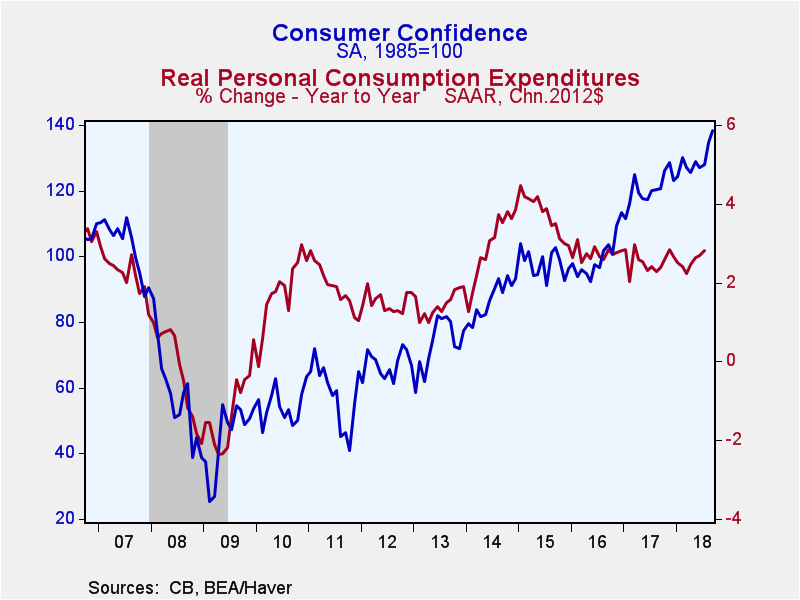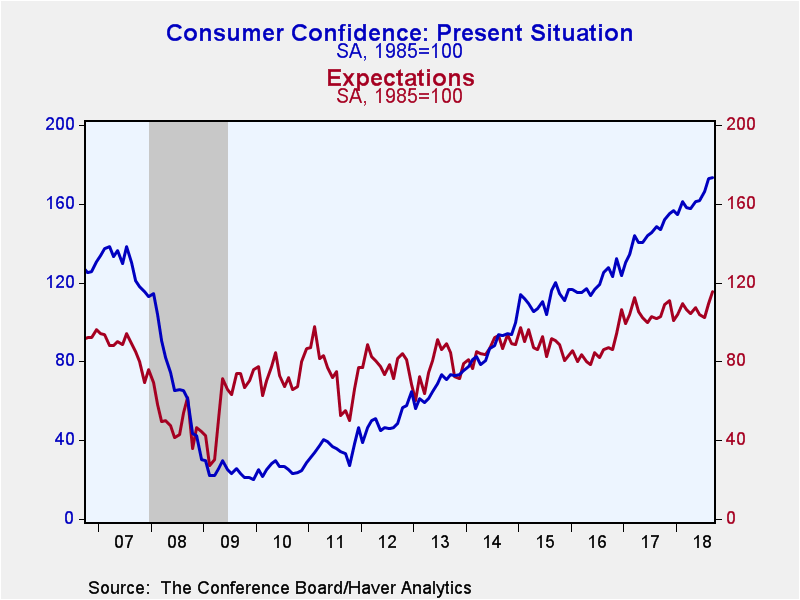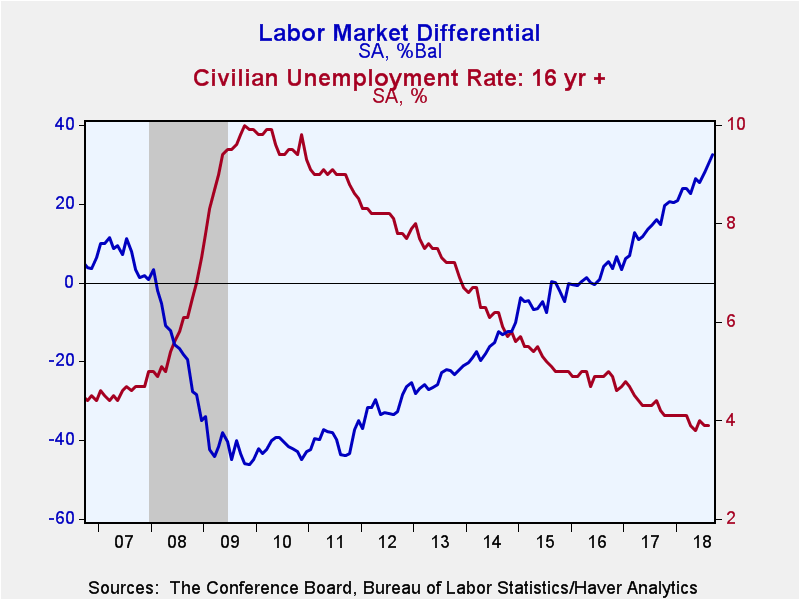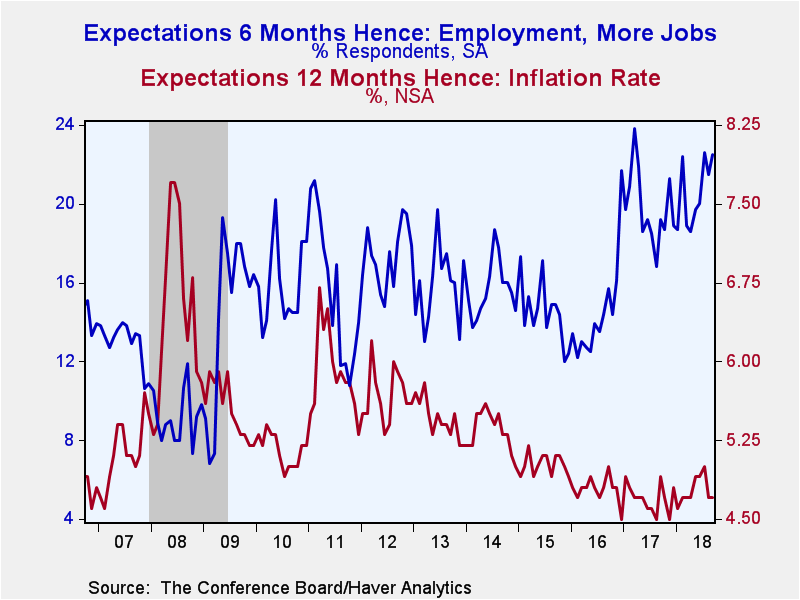 Global| Sep 25 2018
Global| Sep 25 2018U.S. Consumer Confidence Improves Again
by:Tom Moeller
|in:Economy in Brief
Summary
Consumer confidence during September reached the highest level since September 2000. The Conference Board Consumer Confidence Index strengthened 2.7% (14.8% y/y) to 138.4 from 134.7 in August, initially reported as 133.4. The [...]
Consumer confidence during September reached the highest level since September 2000. The Conference Board Consumer Confidence Index strengthened 2.7% (14.8% y/y) to 138.4 from 134.7 in August, initially reported as 133.4. The September level exceeded expectations for 131.5 in the Action Economics Forecast Survey. The indexes in the report are based on 1985=100. During the past 10 years, there has been a 68% correlation between the level of consumer confidence and the y/y change in real PCE.
The expectations component gained 5.5% (11.9% y/y) to 115.3, the highest level since September 2000. The present situation figure improved 0.2% (17.8% y/y) after strong increases in three of the prior four months.
Business conditions were viewed as "good" by a strengthened 41.4% of respondents, and viewed as "bad" by just 9.1%. Jobs were viewed as "plentiful" by an increased 45.7% of respondents in September. Jobs were viewed as "hard to get" by 13.2%, the fewest since March 2001. The net jobs assessment reading increased to 32.5, a 17-year high. Over that time period, the differential has been 95% correlated to the unemployment rate.
Expectations for business conditions rose m/m as 27.6% of respondents thought that conditions would improve. Income was expected to increase in six months by 22.6% of respondents, which was reduced m/m but the trend continued to rise. Expectations that there would be more jobs in six months rose to 22.5% of respondents, up from a 12.2% low in February 2016.
The expected inflation rate in twelve months held steady m/m at 4.7%. It was down from the 5.0% July high. The percentage expecting higher interest rates over the next twelve months fell to 68.2%, down from April's high of 73.1%. Those looking to buy a home in the next six months improved sharply m/m to 6.6%.
Confidence amongst respondents under age 35 years old strengthened to the highest level since September 2000. For those aged 35-54, confidence improved to another 18-year high, and for those over 55 years of age, confidence similarly firmed.
The Consumer Confidence data is available in Haver's CBDB database. The total indexes appear in USECON, and the market expectations are in AS1REPNA.
| Conference Board (SA, 1985=100) | Sep | Aug | Jul | Y/Y % | 2017 | 2016 | 2015 |
|---|---|---|---|---|---|---|---|
| Consumer Confidence Index | 138.4 | 134.7 | 127.9 | 14.8 | 120.5 | 99.8 | 98.0 |
| Present Situation | 173.1 | 172.8 | 166.1 | 17.8 | 144.8 | 120.3 | 111.7 |
| Expectations | 115.3 | 109.3 | 102.4 | 11.9 | 104.3 | 86.1 | 88.8 |
| Consumer Confidence By Age Group | |||||||
| Under 35 Years | 147.8 | 135.8 | 138.3 | 15.9 | 130.2 | 122.4 | 116.0 |
| Aged 35-54 Years | 137.5 | 137.3 | 125.6 | 9.3 | 123.5 | 106.2 | 103.9 |
| Over 55 Years | 133.6 | 132.0 | 123.7 | 17.8 | 112.9 | 84.6 | 84.1 |
Tom Moeller
AuthorMore in Author Profile »Prior to joining Haver Analytics in 2000, Mr. Moeller worked as the Economist at Chancellor Capital Management from 1985 to 1999. There, he developed comprehensive economic forecasts and interpreted economic data for equity and fixed income portfolio managers. Also at Chancellor, Mr. Moeller worked as an equity analyst and was responsible for researching and rating companies in the economically sensitive automobile and housing industries for investment in Chancellor’s equity portfolio. Prior to joining Chancellor, Mr. Moeller was an Economist at Citibank from 1979 to 1984. He also analyzed pricing behavior in the metals industry for the Council on Wage and Price Stability in Washington, D.C. In 1999, Mr. Moeller received the award for most accurate forecast from the Forecasters' Club of New York. From 1990 to 1992 he was President of the New York Association for Business Economists. Mr. Moeller earned an M.B.A. in Finance from Fordham University, where he graduated in 1987. He holds a Bachelor of Arts in Economics from George Washington University.










